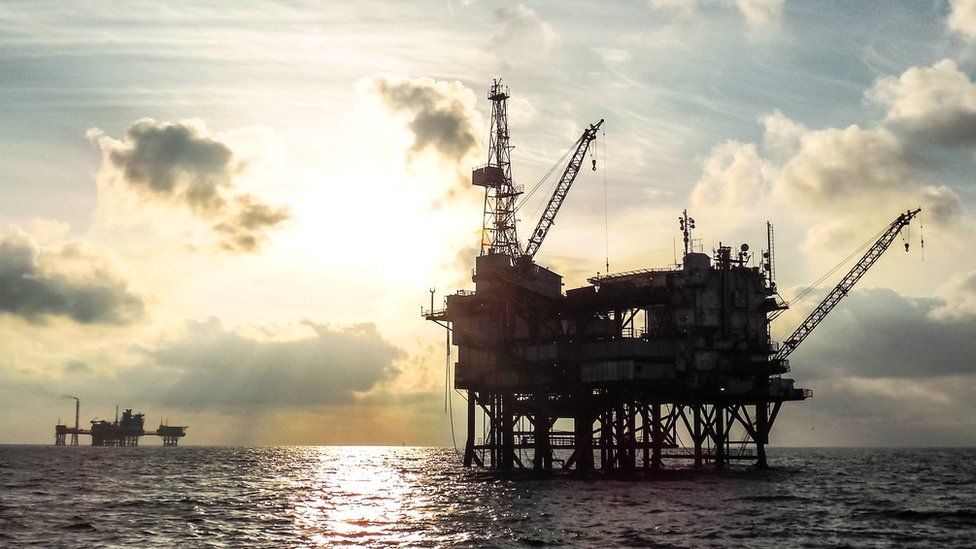ARTICLE AD BOX
 Image source, Getty Images
Image source, Getty Images
The UK government has granted 27 oil and gas licences for projects in the North Sea.
The licences have been issued for projects in central and northern areas of the North Sea and west of Shetland to allow oil and gas resources to be explored and developed.
The energy security secretary said the move was a welcome economic boost.
However, climate campaigners said they intended to challenge the decision in court.
The 33rd Oil and Gas Licensing Round was launched in October 2022 with 931 blocks and part-blocks made available for application.
In addition to the 27 licences, six more blocks, which were also ready to be offered, have been merged into five existing licences.
In total, the North Sea Transition Authority (NSTA) received 115 applications from 76 companies for 258 blocks/part-blocks when the application window closed on 12 January 2023. This was the highest participation since the introduction of the Innovate Licences in 29th Round in 2016/17.
In recent years, the average time from licence award to production has been about five years.
Energy Security Secretary Claire Coutinho said: "These new licences are a welcome boost for the UK industry, which already supports around 200,000 jobs and contributes £16bn to the economy each year - while advancing our transition to low-carbon technologies, on which our future prosperity depends."
The UK government's minister for Scotland, John Lamont, added: "These new licences will help ensure the UK's energy security, which we have all seen is more important than ever, and reduce our need for imported energy."
Prime Minister Rishi Sunak previously told BBC Scotland News that granting new licences was the right thing to do.
'Disregard for future generations'
The announcement has not been welcomed by all.
Philip Evans, climate campaigner for Greenpeace UK, said: "Greenpeace plans to fight these licences in the courtroom, and we're mobilising voters to prioritise climate at the next election, because frankly we're all sick of these backward-facing policies."
The Scottish Green Party said the move showed a "disregard for future generations".
Mark Ruskell MSP said: "In the last few months alone we have seen record temperatures and wildfires and terrible floods in communities across Scotland.
"There is no sustainable future in endless oil and gas drilling.
"We urgently need to reduce our dependence on fossil fuels and make an urgent and lasting investment in the green jobs and industries which are so vital to tackling the climate crisis."
Offshore Energies UK said there were 284 active oil and gas fields in the North Sea and that by 2030 about 180 of those will have ceased production due to natural decline.
These are the straightforward ones. Roughly half of the 27 licences give permission to start development of known reserves and the others are for exploration. All of them are close to existing production platforms, so they take much less time and money to bring to production than a completely new field.
In this licensing round, there have been bids to drill in many other blocks of seabed put on the auction block by the UK government's licensing agency. The others are less straightforward, and have yet to clear a hurdle on environmental impact. But it's expected more will be announced when that process is complete.
This licensing process has not had much attention in the past. There have been more than 30 UK licensing rounds since the 1970s. This one requires bidders to show they are meeting some environmental requirements, including electrification of the production process to cut down on the use of gas in the extraction itself.
But critics want to see much higher barriers to drilling, requiring drillers to justify extraction in terms of the eventual burning of the fossil fuels produced.
The industry has never had to lobby as hard to make the case for continued UK drilling. It's doing so on the grounds that the country is forecast to be looking to oil and gas for around 22% of its energy in 2050 (offset to meet the net zero target) and on the grounds that the alternative imported sources of energy are less reliable and reach us with a much bigger carbon footprint.
Expect this to become ever more political, as Conservatives push for more licensing and seek to portray Labour as being against the industry. Labour has said it will honour licenses agreed ahead of next year's Westminster election, but won't grant any more.
So the industry wants as many projects as possible to be agreed ahead of that national ballot.

 1 year ago
71
1 year ago
71








 English (US) ·
English (US) ·